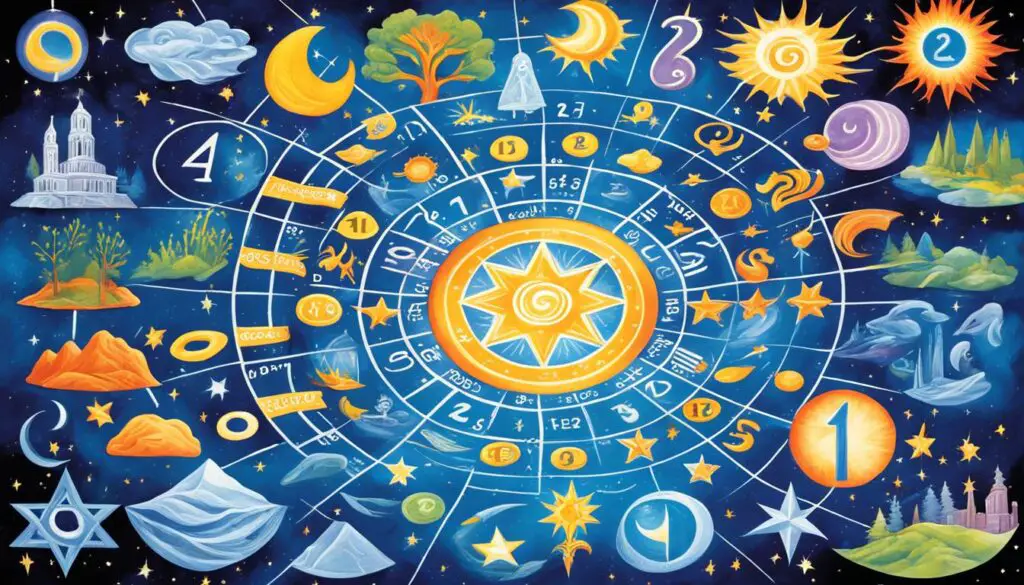In this section, I will delve into the deep spiritual and symbolic meaning of numbers in the Bible. Numbers hold significant importance in biblical texts, often representing divine messages and guiding us on our spiritual journey. By understanding the biblical meaning of numbers, we can gain valuable insights into various aspects of our lives and the world around us.
Numbers carry symbolic meaning in the Bible, and each number has a unique significance. For instance, the number 7 is often associated with completion and perfection, as the seventh day is the day of rest in the creation story. The number 3 represents the Trinity – Father, Son, and Holy Spirit. The number 40 symbolizes a period of testing, preparation, or transformation. These numeric symbols are found throughout the Bible, providing deeper spiritual insights and guidance for believers.
In this section, we will explore the meanings of some key numbers in the Bible.

Key Takeaways:
- Numbers in the Bible hold deep spiritual and symbolic meaning.
- Each number represents a unique divine message and guides us on our spiritual journey.
- The number 7 signifies completion and perfection, while the number 3 represents the Trinity.
- The number 40 symbolizes a period of testing or preparation.
- Understanding the biblical meaning of numbers provides valuable insights into our lives and the world around us.
The Symbolism of Numbers in the Bible
Numbers carry symbolic meaning in the Bible, and each number has a unique significance. Understanding the symbolism of numbers can provide deeper spiritual insights and guidance for believers. Let’s explore some of the biblical numbers and their divine significance:
Number 7: Completion and Perfection
The number 7 is often associated with completion and perfection in the Bible. It represents the seven days of the week, with the seventh day being a day of rest according to the creation story. The symbolic meaning of the number 7 suggests a state of wholeness or the fulfillment of a divine plan.
Number 3: The Trinity
The number 3 holds great significance in biblical numerology as it represents the Trinity – Father, Son, and Holy Spirit. It symbolizes unity, harmony, and divine completeness. Many significant events in the Bible occur in sets of threes, highlighting the divine presence and intervention.
Number 40: Testing and Transformation
The number 40 signifies a period of testing, preparation, or transformation in biblical narratives. It is often associated with a time of purification or growth before significant revelations or breakthroughs. For example, Moses spent 40 days on Mount Sinai, fasting and receiving the Ten Commandments.
The symbolism of numbers in the Bible goes beyond these examples, with each number holding its own significance and message. By exploring these biblical numbers, we can gain a deeper understanding of God’s divine plan and spiritual truths.

| Number | Symbolic Meaning |
|---|---|
| 1 | Unity, God |
| 2 | Duality, balance |
| 4 | Foundation, earthly completeness |
| 6 | Imperfection, sin |
| 8 | New beginnings, resurrection |
Key Numbers and Their Meanings in the Bible
Throughout the Bible, various numbers hold significant meaning and spiritual symbolism. These key numbers provide profound insights into the divine messages conveyed in the scriptures. Let us explore a few of these significant numbers and their biblical numerology.
One of the most prominent key numbers in the Bible is 7. Representing completion and perfection, the number 7 appears repeatedly, emphasizing the divine order in creation. From the seven days of creation to the seven seals and seven trumpets in the Book of Revelation, this number signifies the divine fulfillment of God’s plan.
Another notable number is 12, symbolizing divine governance and foundation. The twelve tribes of Israel and the twelve apostles of Jesus exemplify the spiritual significance of this number. It signifies order, authority, and completeness in the spiritual realm.
The number 40 is also significant in biblical numerology, representing trials, testing, and transformation. Moses spent 40 days on Mount Sinai, Jesus fasted for 40 days in the wilderness, and the Israelites wandered in the desert for 40 years. This number signifies a period of preparation and spiritual growth, leading to a new phase of life.
By understanding the key numbers in the Bible and their spiritual symbolism, we gain a deeper appreciation for the divine messages encoded within the scriptures. These numbers guide us on our spiritual journey, providing insight, inspiration, and divine revelation.
FAQ
What is the biblical meaning of numbers?
Numbers carry symbolic meaning in the Bible and each number has a unique significance. They often represent divine messages and provide spiritual guidance.
What does the number 7 signify in the Bible?
The number 7 is often associated with completion and perfection, as it represents the seventh day, which is the day of rest in the creation story.
What is the significance of the number 3 in biblical texts?
The number 3 symbolizes the Trinity – Father, Son, and Holy Spirit. It represents divine completeness and wholeness.
What does the number 40 symbolize in the Bible?
The number 40 signifies a period of testing, preparation, or transformation. It is often associated with significant events in biblical narratives.
Are there any other key numbers with spiritual meanings in the Bible?
Yes, there are several other key numbers with spiritual significance in the Bible, such as 12, which represents the twelve tribes of Israel, and 666, which symbolizes imperfection and the number of the beast mentioned in the Book of Revelation.







